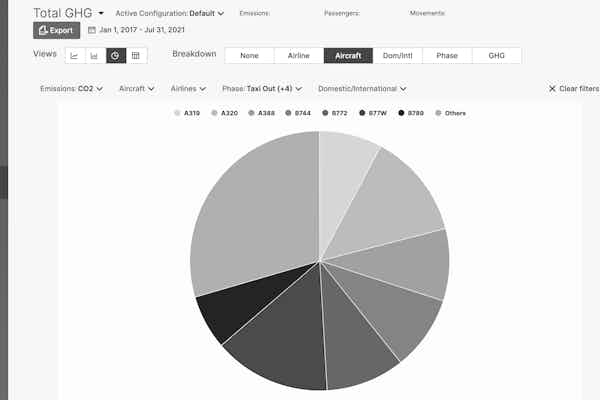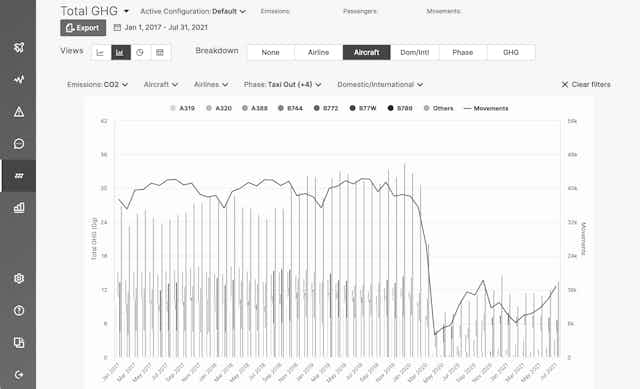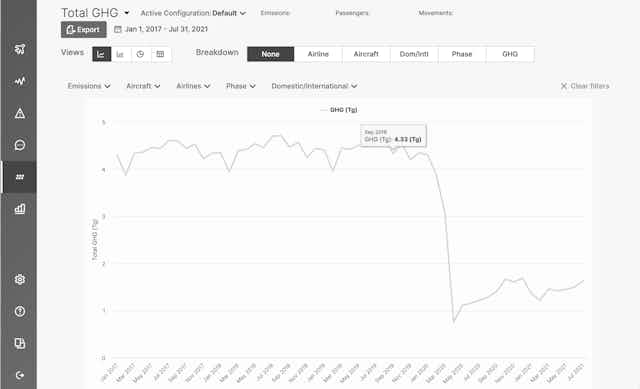
ANOMS Carbon Emissions
Detailed aviation carbon emissions reporting software built to support airport sustainability initiatives today, tomorrow and in the future.

Overview
Aviation carbon emissions reporting software that accounts for every flight phase
There’s increasing pressure on the aviation industry to respond to climate change. Now more than ever, airlines and communities are placing pressure on airports to show that they’re doing all they can to improve operational efficiencies, while continuing to operate sustainably.
ANOMS Carbon Emissions helps airports engage with stakeholders around this issue, providing confidence in industry mitigation, aircraft emissions management and effectiveness of reduction strategies.
Platform features
Aircraft carbon emissions calculator that uses accurate flight track data
ANOMS Carbon Emissions automatically and continually assesses the amount of greenhouse gas emissions and provides aircraft CO2 emissions calculator for every flight phase - including taxiing, holding, landing, take-off and en-route.
Our aviation carbon emissions management software is provided at a lower cost than traditional methods. The platform provides more accurate and detailed aircraft emissions management data which is immediately available for reporting and analysis to support airport sustainability.
The most detailed aircraft C02 emissions calculator available
Emissions calculation data is based on actual flight tracks and weather conditions rather than using averages or approximations.
Demonstrate CSR around aircraft emissions management
Data can be included in airports' environment and corporate social responsibility reports, so you can proactively demonstrate your airport’s green credentials.
Support airport sustainability initiatives for emissions reduction
Ensure the community and decision makers draw the right conclusions and understand how operations are proactively working to reduce impact.
Best-practice methodologies on aviation carbon emissions
The Aircraft CO2 emissions calculator follows best practices, using the methodology described in the ICAO Airport Air Quality Manual (Doc 9889).
Inside the product
Detailed aviation carbon emissions management data powered by world-leading ANOMS software
ANOMS Carbon Emissions reporting software is provided at a lower cost than traditional methods, while providing more accurate and detailed aircraft emissions management data.

Visualise aircraft emissions management and segment data into relevant categories
Information can be viewed in total, or segmented into categories such as movement, passenger, passenger per kilometre and terminal manoeuvring area efficiency.

Aircraft carbon emissions calculator based on actual flight track data
Quantify airport emissions based on actual flight tracks and weather conditions while using methodology described in the ICAO Airport Air Quality Manual (Doc 9889).

Support your airport's sustainability initiatives and emissions reduction strategies
Easily report on your airport’s environment and corporate social responsibility efforts to demonstrate green procedures while building social license to operate.

Customer service
World class service to help your site get up and running quickly
Our team of specialists will work with you to address your site's specific requirements. We can answer questions you may have about operational or environmental challenges that your site may be experiencing.
We can make recommendations for third-party hardware or we can hook directly into pre-existing environmental monitoring and sensor networks at your site. Our platform is 'sensor-agnostic'.
FAQs
Here are some answers to common questions around aviation carbon emissions. Reach out to our team today if you don't see the answer you are looking for.
Digital technology enhances airport sustainability by monitoring and managing aviation carbon emissions and optimizing airspace to reduce fuel burn and taxi time. Advanced airport management solutions and IoT sensors track emissions in real-time to optimise ground operations and reduce fuel burn, ultimately lowering aviation carbon emissions and enhancing airport efficiency.
The aviation industry incorporates aviation carbon emissions management into airport sustainability plans through strategies like optimizing flight paths with advanced air traffic management systems, using sustainable aviation fuels, investing in renewable energy, adopting energy-efficient infrastructure, and employing real-time data analytics and IoT for emissions monitoring. These measures collectively aim to reduce carbon footprints and achieve sustainability goals.
Airports support their local communities through sustainability efforts by effectively designing airspace for noise reduction measures and air quality improvements that benefit nearby residents. Additionally, they execute community outreach programs to educate and involve locals about operational activities in their locality.
Digital solutions for airports play a key role in reducing aviation carbon emissions by automatically and continually assess the amount of greenhouse gas emissions and provide aircraft CO2 emissions calculations for every flight phase – including taxiing, holding, landing, take-off and en-route.
Catch up on the latest insights for all things ANOMS Carbon Emissions
about your airport sustainability requirements.
